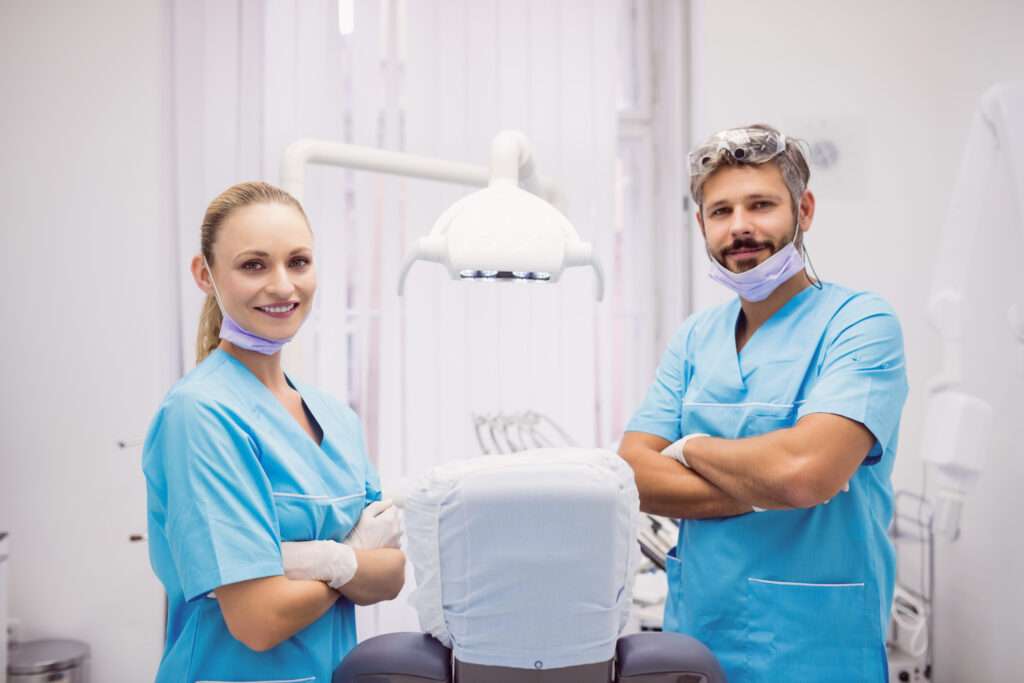
People commonly seek advice regarding the best professional choice to maintain dental health between dentist vs orthodontist. Still undecided about which dental specialist to consult? The decision boils down to dentist versus orthodontist. Oral health requires both experts despite their differing fields of expertise. Learning these distinctions helps you select excellent dental healthcare options for your needs.
Dentist vs Orthodontist- What Does a Dentist Do?
Patients should visit the dentist when they need primary oral healthcare. Dental professionals assess diagnosis and provide preventive care while treating usual oral health concerns, including tooth decay, gum disease, and cavities. The dental expert helps patients achieve maximum oral health by giving them essential advice about proper hygiene practices, such as how to brush correctly and floss effectively.
Regular dental examinations, together with fillings and root canal treatment, can best be assessed by an experienced dentist while also providing tooth whitening procedures when needed. Deciding between an aligner dentist and orthodontist for minor teeth alignment falls easy since several dental practitioners perform orthodontic services that include clear aligners.
Dentist vs Orthodontist– What Does an Orthodontist Do?
Orthodontic professionals dedicate their practice to bite adjustment alongside tooth realignment. Following dental school graduation, new dentists enter specialized training that helps them identify and treat dental misalignment as well as jaw problems and tooth misplacement. The specialist deals with braces as their core practice together with FirstClass Aligners and alternative orthodontic instruments.
An orthodontist is frequently a better option if your misalignment is severe. An aligner dentist vs. orthodontist selection for mild straightening, however, may rely on your preferences and the case’s complexity.
Dilemma Of choosing Between a Dentist vs Orthodontist.
People require either a dentist or orthodontist depending on the condition they need their teeth to address.
Visit a Dentist if:
- The dental services you require for general oral health care include cleanings with possible cavity fillings or treatment for gum disease.
- You wish to have teeth straightening solutions combined with dental cosmetic improvements.
- If you require dentist services that welcome families then you should look for dental care. Your search for quality dental care should focus on identifying the Best Dentist for Families who will provide excellent services to everyone.
Visit an Orthodontist if:
- Your teeth display an unbalanced condition, which features crowded teeth, misalignment, or gaps.
- Orthodontic patients need either braces or FirstClass Aligners or alternatives to straighten their teeth.
- Your bite requires correction since you have overbite, underbite, or crossbite problems.
Dissimilarities between dentists and orthodontists ?
The dental field separates dentists from orthodontists, and although both work toward oral health, they perform different services.
The training process for a Doctor of Dental Surgery (DDS) or Medicine in Dentistry (DMD before orthodontists complete their specialized training focused on dental and jaw alignment correction.
Dental service providers concentrate on general oral treatments to deliver cleanings, fillings, extractions, and cosmetic treatments to patients. As specialists, orthodontists provide treatment through braces, aligners, and orthodontic appliances to remedy misalignment problems.
Who Should You See?
People who require dental care for cavities, gum disease treatment, or basic procedures should seek attention from a dentist. Visitors with concerns about teeth alignment and bite misalignment need to consult an orthodontist.
How Does a Dentist Help with Oral Health?
People depend on dentists for dental health support for their teeth and gums. Scheduling routine dentist appointments assists in detecting dental problems when they are still easy to address. Your dental health benefits directly from the following actions of a dentist:
Preventive Care and Check-ups
During regular dental appointments, dentists detect and treat tooth cavities, gum disease, and oral infection symptoms at their earliest stage. You will receive crucial Oral hygiene directions for maintaining good oral health routines at home through their consultations.
Treatment of Common Dental Problems
The dental practice of dentists comprises cavity treatment alongside the care of gum disease and many other dental conditions. Cosmetic Dentistry Services
Patients check in with dental professionals because they seek cosmetic treatments, teeth whitening services, and veneer and bonding procedures. Your dentist will suggest suitable treatments to make your smile whiter if you desire this result.
Best Dentist for Families: What to Look For?
If you’re searching for the trusted Family dentist, consider one that offers comprehensive care for both adults and children. Family dentists provide preventive services, pediatric care, and flexible scheduling to accommodate everyone’s needs.
Common Myths About Dental and Orthodontic Care
Several incorrect ideas persist about dental care as well as orthodontic treatment procedures. The following points explain why these practices are incorrect:
Myth 1: Only Kids Need Braces
Orthodontic treatment serves adults just as much as children. Dentists now observe a growing number of patients choosing clear aligners and invisible braces as they age.
Myth 2: Dentists and Orthodontists Provide the Same Services
Some dentists provide orthodontic therapy, but specialist insight in tooth positioning and jaw realignment exists only within orthodontic practice.
Myth 3: You Don’t Need to See a Dentist If You Have Braces
All patients who receive orthodontic treatment require systematic dental check-ups from their dental provider’s office. Tooth decay becomes more likely because dental hygiene is challenging when wearing either braces or aligners.
How to Maintain Good Oral Health during Orthodontic Treatment
Orthodontic treatment requires you to maintain dental and gum health as an essential priority. Use the following Oral hygiene tips as guidance:
- After each eating session, brush your teeth to stop food from sticking inside your braces and aligners.
- Cleaning can be achieved between the teeth and wires using floss threaders or water flossers.
- People should use mouthwash as a method of reducing bacteria and plaque.
- You should prevent eating chewy or difficult-to-chew foods since they might harm both brackets and aligners.
The Price Difference Between Dentists vs Orthodontists
The medical procedures needed to treat patients establish how much orthodontist and dentist services will cost. Orthodontic procedures cost substantially more than dental procedures, including cleanings and fillings combined with extractions. Available insurance coverage programs and subscription-based dental plans help patients afford dental expenses.
Dentist vs. Orthodontist: Who Should You Choose for Clear Aligners?

When deciding to get straightening orthodontics through transparent clear aligners, you must choose between visiting an orthodontist or an aligner dentist. Conventional dentists currently provide FirstClass Aligners and other clear aligner treatments to patients. Examples of complicated alignment problems are treated by orthodontists who have received additional specialized training in this field.
A professional dentist possesses the skills necessary to provide aligners for standard teeth alignment procedures. Your condition requires the expertise of an orthodontist unless the necessary corrections are basic. The experts will provide teeth straightening assistance regardless of your selection.
What Is The Proper Duration For Brushing Your Teeth?
There exists a common question regarding the health effects of spending 6 minutes brushing one’s teeth. While thorough brushing is essential, experts generally recommend two minutes per session, twice a day. Brushing for six minutes occasionally won’t harm your teeth, but overdoing it regularly could wear down enamel and irritate your gums. Instead, focus on using the proper technique and a soft-bristled brush.
Conclusion: Selecting the Correct Option
Consider your dental needs while choosing between a Dentist vs Orthodontist. A dentist is the expert to consult if you need general dental care. On the other hand, an orthodontist is an expert who can consult if you are concerned about bite correction or tooth alignment.
Additionally, if you’re thinking about getting clear aligners, consider the advantages of seeing an aligner dentist versus an orthodontist, depending on how complicated your situation is. Your smile will remain healthy and radiant regardless of your decision if you prioritize routine dental checkups and proper oral hygiene!







